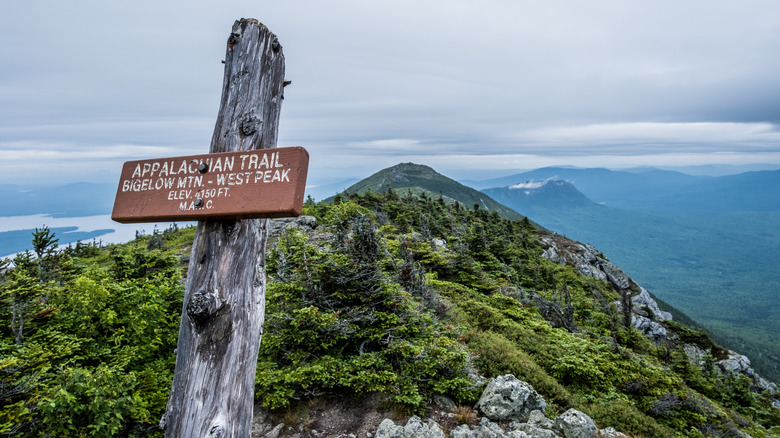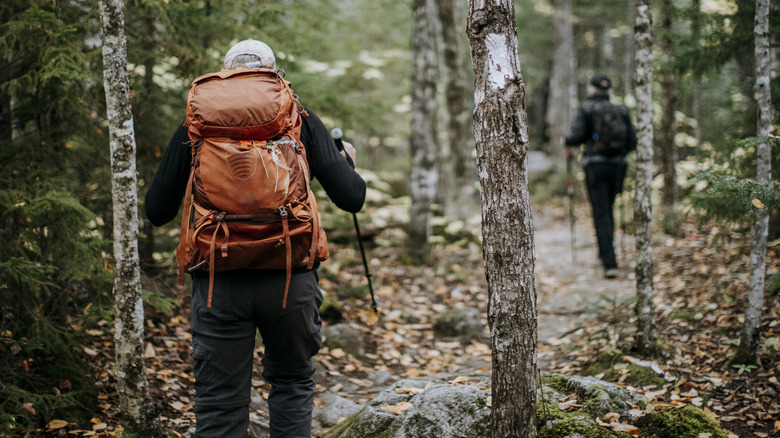How Long You Need To Prepare For A Thru-Hike Like The Appalachian Trail, Per Hikers
Each year, about 3 million people hike part of the Appalachian Trail. But if you add up every person who has officially completed it, that number is only 20,000 — dating all the way back to 1936. After all, the full "AT" is about 2,190 miles long, crossing a total of 14 states from northern Georgia to northern Maine. Even the most dedicated thru-hiker requires about five to seven months to march from end to end.
Meanwhile, there are other long U.S. trails to choose from: The Pacific Crest Trail winds its way through the Rocky Mountains and extends 2,650 miles. Then there's the Continental Divide Trail, which crosses 3,100 miles of land from Canada to Mexico; hikers can expect to climb 457,000 feet over the course of their border-to-border journey. Naturally, epic trail systems aren't limited to the United States; you can find comparable long-distance hikes all over the world.
So how long should you prepare for a journey of this magnitude? What do you pack, and how do you train your body to endure such relentless exertion? Many outdoorspeople have weighed in on this problem, and we can say with confidence that there is no right answer. Cheryl Strayed, the famed memoirist and author of "Wild," had never really backpacked before she took on the PCT in 1995, yet she completed a 1,100-mile segment. Conversely, plenty of seasoned thru-hikers with all the right equipment have been injured (or even killed) on these routes. The length of preparation depends largely on your experience, fitness level, and equipment you've already broken in.
Gearing up for the long-distance hikes
First, what should you bring? That's the easier question, because it boils down to a checklist. The Appalachian Mountain Club lists 10 essentials for any multi-day hike: a map, a compass, warm layers, a warm hat, extra food and water, a flashlight or headlamp, fire starter, a first aid kit, a whistle, a waterproof shell, and a knife. Beyond the bare essentials, most backpackers will, of course, bring a backpack, plus cooking equipment, a tent, and sleeping bag. There are endless customizations as well, depending on your needs and weight restrictions. The Appalachian Trail Conservancy lists accoutrements like ankle-gaiters, hiking poles, a sun hat, and bandanas.
You could spend months reviewing different lists online, then comparing brands and models. Tools as fundamental as boots and cookstoves come in endless varieties, and you'll want to test all of these items before you hit the ground in earnest. Once you have a complete arsenal, you'll want to pack everything into you backpack, to make sure it fits and can still be carried for miles each day. It's typical for rookie hikers to overpack and gradually shed the items they don't need. Here's our ultimate guide to packing the best and safest hiking gear.
If you're already a skilled hiker with many overnights under your belt, there may not be much to accrue. Many hikers maintain a "ready pack," so they can just take at a moment's notice. Remember, too, that thru-hikers usually leave the trail every three to five days — to resupply, shower off, or simply take long breaks. There's no rule against replacing that mug or shoelace mid-hike.
How hard should you train?
Physical training is a little more complicated. Some people attempt a long trail without any serious exercise beforehand, arguing that the hike itself will whip you into shape. If you're patient and single-minded about your goal, that tactic might just work. Others are intense and methodical; the outfitter REI recommends aerobic exercises and resistance training in the weeks leading up to your first day, gradually increasing the length and strenuousness of your workout. Personal trainers may outline a three-month, step-by-step regimen that's heavy on the squats, pull-ups, and stretches. One of the latest fitness trends is "rucking," which involves walking or stair-climbing with a heavily loaded backpack; this practice is ideal for trail-training.
As with your gear, an experienced hiker may not require much time to feel ready. A 1,200-mile trek through the European Alps on the Via Alpina might just feel like a longer version of multi-day hikes you've already done, so you can get started sooner than later. Meanwhile, even the most rehearsed thru-hikers can get stymied by factors well beyond their control, like weather, health issues, or family emergencies. At some point, the preparation has to end, and you just have to put your best foot forward.


